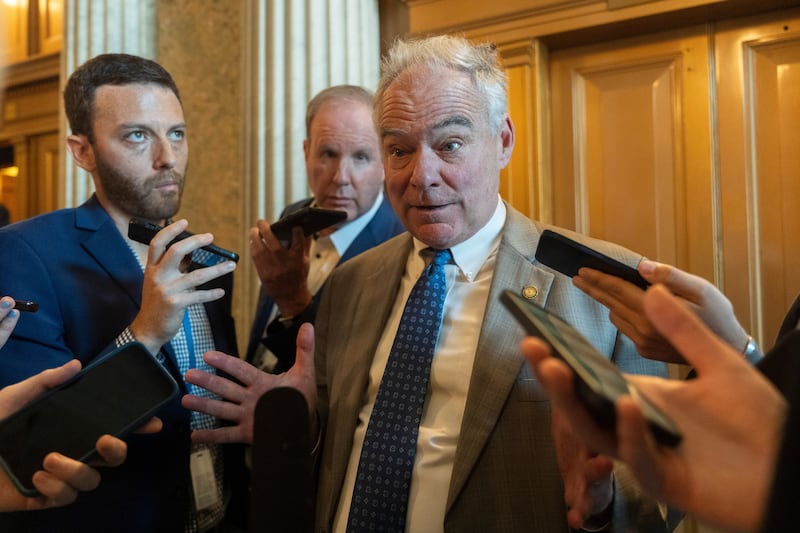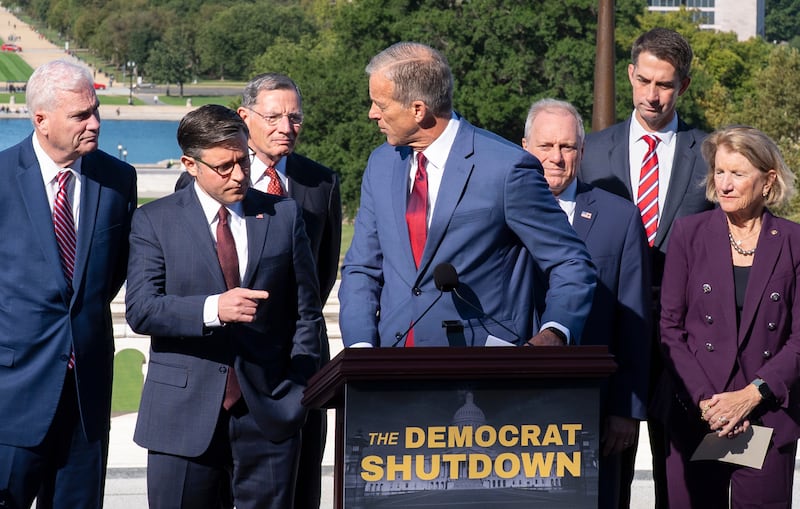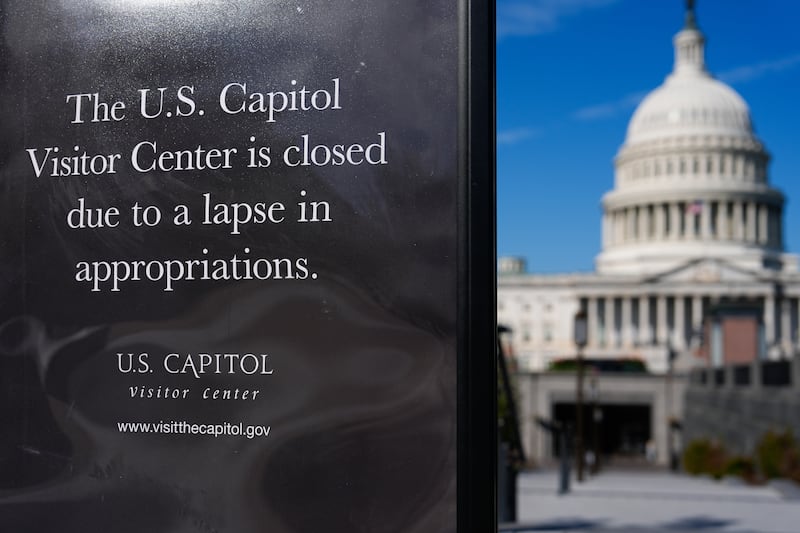WASHINGTON — A bipartisan group of senators is working quietly to secure a deal on government funding, hoping to limit the effects of a federal shutdown that began shortly after midnight on Wednesday.
A group of roughly a dozen senators gathered on the Senate floor during votes on Wednesday to discuss possible backup plans to reopen the government, suggesting a number of different options that could garner bipartisan support. No plan has been finalized, according to senators involved with the conversation, but it’s opened the door to negotiations that could serve as an off-ramp for Democrats in their defiance to the Trump administration.
“The bottom line here is that I sense real concern among my Republican colleagues about what happens to the people they represent if we go off the cliff on the Affordable Care Act,” Sen. Peter Welch, D-Vt., said of the conversation. “They share that concern, that’s a place to begin. How do we solve it? To be determined.”
The conversation took place as the Senate failed to pass a Republican-led resolution to fund the government until Nov. 21, marking the third time the bill has been rejected when brought to the floor for a vote. Instead Democrats are demanding to include language to reverse health care cuts previously approved in President Donald Trump’s tax package this summer and to permanently extend Obamacare tax credits, at a cost of more than a trillion dollars.

Sen. Tim Kaine, D-Va., said both of those demands were brought up on the floor, as well as proposals to rein in Trump’s ability to unilaterally withhold funding. But, the Virginia Democrat noted, no agreement has been reached.
“A deal should be a deal,” Kaine said. “And we need a path forward to find some health care fixes.”
Other proposals being floated included a shorter stopgap funding bill, ranging from seven days to 45 days — shorter than the 50-day bill rejected this week. But that idea has been rejected by top House Republicans, meaning it could be dead in the water.
“I think we’re better off to pass the CR to the 21st and get back to work on appropriations bills,” Sen. John Hoeven, R-N.D., said.
Meanwhile, the Senate will continue voting on the Republican spending proposal throughout the weekend as part of GOP leaders’ newest strategy: to wear Democrats down.

Top Senate Republicans say they won’t engage in talks while the government is closed, pushing Democrats into a corner as they demand concessions on health care and a reversal of some of President Donald Trump’s more controversial spending cuts. Instead, Sen. John Thune, R-S.D., told reporters he would give Democrats “additional opportunities” to vote on the original spending resolution, with any negotiations to be saved for later.
“How does this end? Well, it ends when the Senate Democrats pick this bill up, passed by the House of Representatives, and vote for it,” Thune told reporters on Wednesday. “It’s on the floor of the Senate, we’re going to vote later this morning on this.”
That vote ultimately failed on the Senate floor as it didn’t reach the 60 votes needed to overcome a filibuster. Still, three Democrats or Democratic-aligned independents crossed party lines to support the GOP bill — which Republican leaders say is a sign of momentum for more to come.
“What’s interesting now is some of the Democrats are joining us. Our vote last night was a bipartisan vote,” Thune said. “There were three Democrats who came over and voted with us, because they know the strategy is a losing one, and it hurts the American people.”
When the Senate first voted on the Republican spending bill on Sept. 19, only one Democrat broke with party leadership to vote in favor: Sen. John Fetterman, D-Pa.

But by this week, two more joined the fold: Sens. Catherine Cortez Masto, D-Nev., and Angus King, I-Maine, who caucuses with Democrats.
Republican leaders pointed to the early rebellion as a sign of disarray for Democrats, arguing more party members are sure to follow.
“Yesterday on the Senate floor, the cracks started to appear in the Democrat base,” Senate Majority Whip John Barrasso, R-Wyo., said on Wednesday. “Three Democrats voted with the Republicans to prevent a shutdown, and why? Because they know the American people are hurt when the government shuts down.”
The Senate failed to pass a spending bill to reopen the government Wednesday morning, leaving lawmakers in a bitter stalemate as Democrats and Republicans spar over what policies should be included in a temporary funding bill.
Senators rejected two separate spending proposals to fund the government just hours after federal funding expired and agencies were forced to halt operations and place thousands of workers on furlough until further notice.
The failed votes mark the third time that Senate Democrats have rejected the Republican spending proposal as top party leaders remain adamant they won’t back a bill that doesn’t contain major health care concessions.
Republicans’ bill would extend current spending levels until Nov. 21, giving appropriators an additional seven weeks to finalize full-year funding bills for fiscal year 2026. The package would also tack on millions of dollars in supplemental spending for lawmaker security — but stops short of including any additional policies.
Republicans argue that negotiations on health care spending or extending Obamacare tax subsidies must be separate from a temporary spending bill, thrusting both parties into a catch-22 situation: Republicans won’t negotiate until an extension is passed and Democrats won’t vote for an extension until they secure a health care deal.
At least seven Democrats or Democratic-aligned independents are needed to support the GOP-led bill, but so far only three have crossed party lines to do so. Republicans will likely need an additional Democrat to vote in favor as Sen. Rand Paul, R-Ky., has consistently voted against the spending resolution.
The GOP spending bill failed on Wednesday in a final vote of 55-45.
Meanwhile, Democrats have forced votes on their counterproposal, which would have extended current government funding until Oct. 31 and provide millions of dollars in additional spending for lawmaker security. The bill also includes language to reverse health care cuts previously approved in President Donald Trump’s tax package this summer and to permanently extend Obamacare tax credits, at a cost of more than a trillion dollars.
GOP leaders rejected those demands, arguing any legislation on health care tax subsidies should be handled in separate negotiations. Similarly, Republicans have repeatedly rejected Democrats’ attempts to rein in Trump’s authority in advancing his agenda.
“This is an extraneous matter right now,“ House Speaker Mike Johnson, R-La., said on Wednesday. “What the Democrats are doing is trying to grab a red herring. They’re trying to bring in a December policy decision.”
The failed votes leave the Senate at a standstill without a clear path forward. Party leaders could continue talks, although those have not yielded promising results over the last few days.
Thune also warned on Tuesday that Republicans would not engage in negotiations during a shutdown, essentially telling Democrats they must vote to advance the stopgap bill that temporarily extends funding if they want the shutdown to end.
The Senate is likely to vote again sometime Wednesday afternoon on unrelated legislation, although it’s unlikely GOP leaders will bring the spending bills to the floor again for another vote. The Senate won’t be in session Thursday to observe Yom Kippur, meaning the next votes are likely to occur on Friday.
Barrasso said votes could drag into the weekend.



